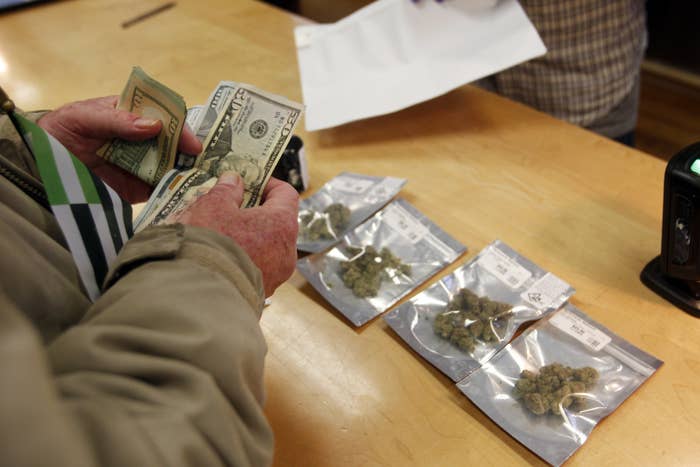
Members of the House of Representatives approved a historic bill Friday that would decriminalize cannabis on the federal level, the first time they have considered removing it from the list of federally controlled substances.
Known as the MORE Act, the Marijuana Opportunity Reinvestment and Expungement Act of 2020 would also expunge the records of people who have been convicted under federal marijuana laws and end the legal contradiction across much of the country where states have legalized the use of cannabis despite remaining illegal on the federal level.
"This long overdue legislation would reverse the failed policy of criminalizing marijuana on the federal level and would take steps to address the heavy toll this policy has taken across the country, particularly on communities of color," Rep. Jerrold Nadler of New York, who introduced the legislation, said in a statement.
The vote passed mostly along party lines, with Democrats overwhelmingly casting 213 votes in favor of the bill, and Republicans casting only 5 votes for the bill.
Friday's vote would be the first time any of the two houses in Congress have taken up the issue since marijuana was labeled a Schedule I criminal substance under President Nixon.
It would also follow the actions across most of the 50 states over the years, where cannabis has been legalized for medical use across 36 states, as well as Washington, DC, and approved for recreational use in 15 states.
"It is not surprising that over the past two decades, public support for legalizing marijuana has surged," Nadler said. "Indeed, the states have led the way — and continue to lead the way — on marijuana, but our federal laws have not kept pace with the obvious need for change. We need to catch up because the public supports reform and because it is the right thing to do."

Despite Friday's vote in the House, however, the unprecedented vote is not expected to get picked up by the Republican-controlled Senate and, therefore, not reach the president's desk for approval.
On Thursday, Senate Majority Leader Mitch McConnell mocked the House's vote.
"The House of Representatives is spending this week on pressing issues like marijuana. You know, serious and important legislation befitting this national crisis," McConnell said on the Senate floor.
In 2018, McConnell supported a bill that legalized hemp on the federal level, but has publicly opposed any movement to legalize the medical or recreational use of cannabis.
In late 2019, he was awarded a machete — symbolic for chopping down cannabis plants — for his "commitment to a drug-free Commonwealth."
His office also posted a statement on his website titled "Pelosi's House Decides to 'Puff, Puff, Pass' on Job-Saving PPP and COVID Relief."
Legislators have been stuck in a monthslong impasse for another coronavirus relief package while people continue to struggle amid a third wave of the pandemic and the prospect of states issuing additional stay-at-home orders as infection rates soar.
This week, months after the benefits from the last coronavirus relief package had expired, Democrat leaders in both houses announced they would back a $908 billion bipartisan bill.
Republicans in the Senate, and President Donald Trump, however, have not said whether they would back the bill.
Nadler, however, has defended his backing of the MORE Act, saying it would address the legal conflict that remains in states that have legalized it, as well as the racial disparities in the disparate enforcement of pot laws.
"As a consequence of this decision, thousands of individuals—overwhelmingly people of color — have been subjected, by the federal government, to unjust prison sentences of marijuana offenses," Nadler said in a statement. "It is time for this manifest injustice to end. The MORE Act would remove marijuana from Schedule I and the Controlled Substances Act altogether, thereby decriminalizing it at the Federal level."
The bill would also move to tax sales of cannabis and create an "Opportunity Trust Fund" in the Department of Treasury to fund programs that would provide job training, reentry services for convicts, and resources to people who have faced cannabis-connected convictions that have prevented them from entering the cannabis industry.
The National Organization for the Reform of Marijuana Laws praised the vote to approve the bill, despite its chances of actually becoming law.
"By going on the record with this vote, House members have set the stage for a much-needed legislative showdown in 2021 when we will have the Biden administration in office — one that has publicly expressed an appetite for advancing the restorative remedies outlined in the MORE Act," the group said in a statement. "So today we celebrate. Tomorrow, we get back to work."
